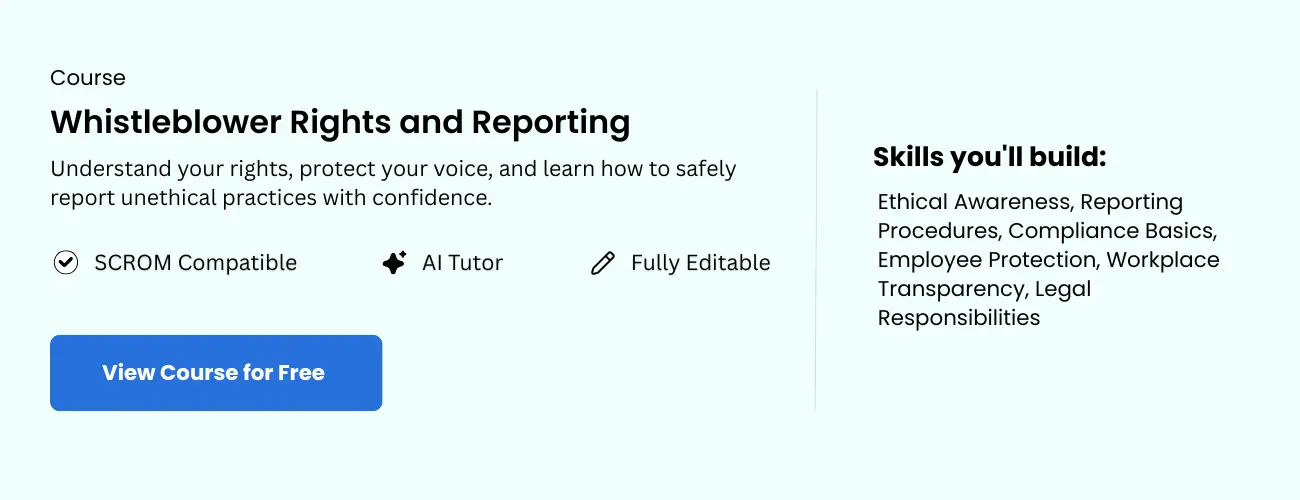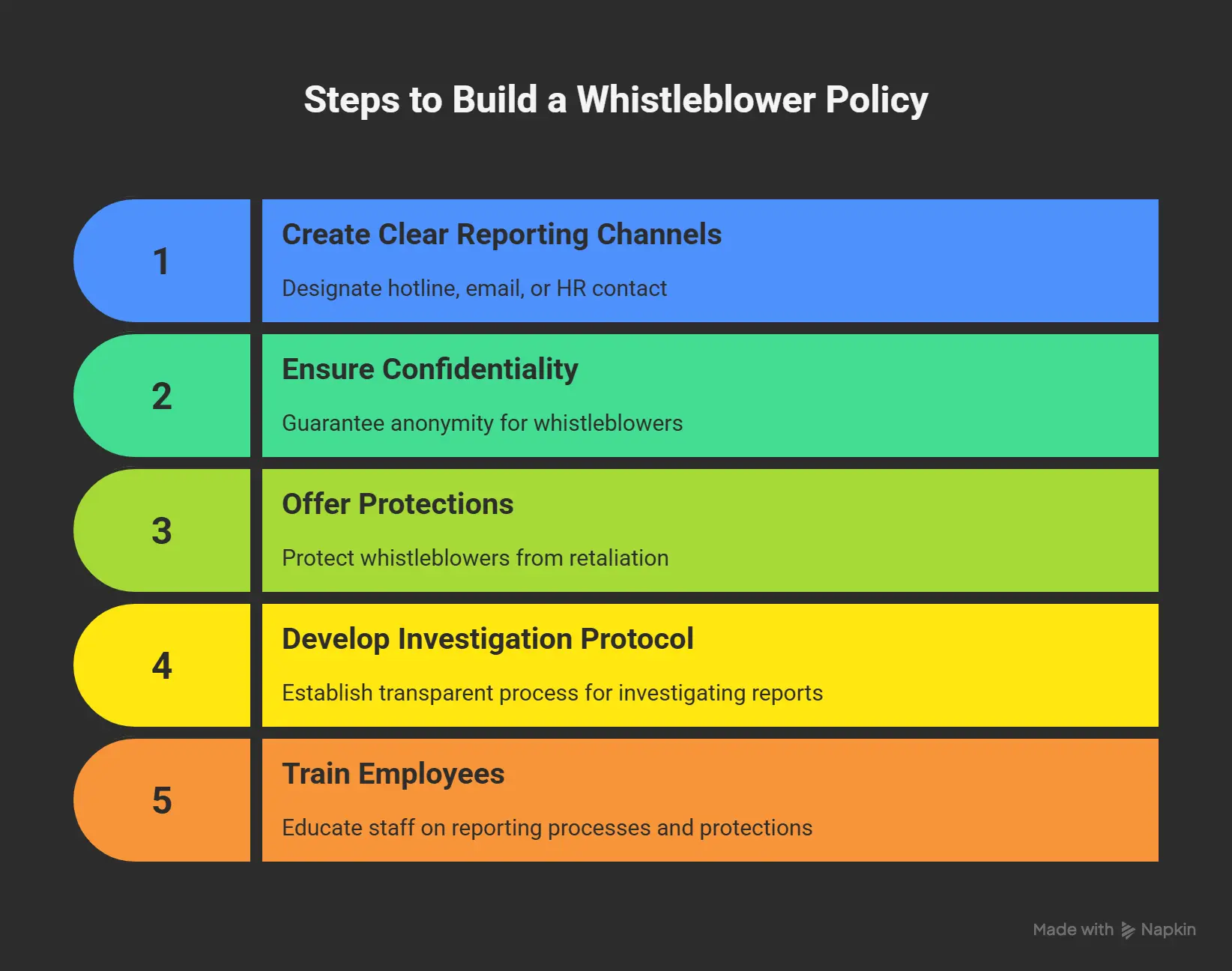
THANK YOU
FOR YOUR INFORMATION
One of our expert will be in touch with you…

In today’s complex regulatory landscape, organizations must proactively revise their whistleblowing policies to align with emerging legal requirements and industry best practices. As regulations around transparency, accountability, and data protection evolve, relying on outdated policies can expose companies to significant legal, financial, and reputational risks making whistleblower training for employees more essential than ever.
An effective whistleblowing system acts as a crucial safeguard, enabling early detection of misconduct, prompt resolution, and fostering a culture of integrity. Modernized policies, supported by comprehensive whistleblower training for employees, ensure protections against retaliation, confidential handling of reports, and thorough investigations.
Regularly reviewing and updating these policies demonstrates a firm commitment to compliance, empowers employees and stakeholders to report concerns without fear, and builds trust. This proactive stance strengthened through consistent whistleblower training for employees helps prevent costly legal penalties and supports an ethical corporate environment capable of adapting to ongoing regulatory changes.
Maintaining an efficient reporting system is essential for compliance, transparency, and integrity. However, over time, certain signs may indicate that your whistleblowing infrastructure is outdated, risking legal, regulatory, and reputation damage. Recognizing these indicators early allows for timely upgrades leveraging modern solutions like Paradiso Course Catalog to stay ahead of compliance challenges.
This section outlines key warning signs including technological gaps, behavioral shifts among whistleblowers, and legal or reputational vulnerabilities.

Building an effective whistleblowing framework is vital for transparency, accountability, and compliance. A modern system incorporates several core features: anonymity, ease of access, security, technological innovation, and compliance with relevant laws like GDPR. These elements are fundamental to establishing a trustworthy environment that encourages reporting and protects organizational integrity.
Trust in reporting mechanisms hinges on guaranteed anonymity. Modern platforms provide anonymous channels, allowing employees to report misconduct without fear of retaliation. Ensuring confidentiality through secure data handling and discreet communication protocols fosters transparency and aligns with legal standards.
Accessibility boosts participation. Intuitive interfaces, multiple reporting channels like online portals, mobile apps, and hotlines reduce barriers. These elements simplify reporting, increase engagement, and facilitate early misconduct detection.
Protecting sensitive information is paramount. Features such as encryption, multi-factor authentication, and secure servers safeguard whistleblower identities and organizational data. Regular security audits and strict access controls preserve report integrity throughout investigations.
Emerging tech includes artificial intelligence (AI) and blockchain. AI streamlines case triage, detects patterns, and prioritizes cases, enhancing efficiency. Blockchain provides immutable records for transparency. Such tools improve accuracy, timeliness, and compliance efforts.
Legal compliance remains essential. GDPR mandates careful handling of personal data—lawful processing, minimal data collection, and transparent use. Systems must respect local laws and industry-specific standards, ensuring integrity and trustworthiness.
Ensuring an efficient whistleblowing system requires ongoing refinement through policy updates, stakeholder involvement, training, and systematic assessments.
Policy revision involves:
Promote transparency through:
Continuous training ensures competency and confidence. Key approaches include:
Ongoing evaluation encompasses:
This integrated strategy—policy updates, stakeholder involvement, and training—ensures a resilient, compliant system that celebrates ongoing organizational growth and integrity.

In today’s intricate regulatory setting, a strong understanding of compliance, ethical practices, and whistleblowing processes is vital. Paradiso’s comprehensive online courses elevate organizational knowledge, fostering a culture rooted in transparency and accountability.
Our curriculum covers essential topics such as anti-corruption measures, ethical decision-making, and effective whistleblowing procedures. Real-world case studies offer practical insights—like how multinational corporations implement anonymous, confidential reporting systems—guiding employees on best practices.
Using Paradiso’s state-of-the-art platform, organizations benefit from engaging, customizable modules, automated assessments, and analytical dashboards.
Regular updates and refresher courses keep pace with regulatory changes and emerging ethical issues, reducing legal risks and enhancing reputation. Embedding these training programs promotes a genuine culture of integrity where employees are well-equipped to uphold high compliance standards.
An effective whistleblowing system demands ongoing review and adaptation, aligning with new legal standards, organizational shifts, and industry best practices. Routine evaluations reinforce your organization’s commitment to ethics and transparency.
As regulatory frameworks change, static policies risk becoming obsolete, increasing compliance and reputational risks. According to OECD Guidelines, regular reviews uncover gaps, integrate lessons learned, and adapt to challenges—keeping your whistleblowing system responsive and trustworthy.
Technological upgrades and training investments promote transparency and compliance, embedding continuous improvement into your organizational culture. Regularly revisiting policies ensures your commitment to integrity remains resilient and aligned with best practices.